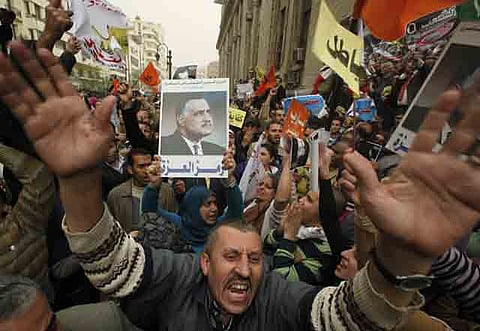Egypt protesters say new parliament is 'void'
Protesters challenge legitimacy of the parliament, terming election bogus

Cairo: Hundreds of Egyptian opposition activists protested over what they said were bogus elections that had produced an illegitimate parliament, even as the president hailed the vote as a "milestone" for democracy.
The protest took place outside the Supreme Court in downtown Cairo on Sunday shortly after President Hosni Mubarak congratulated the ruling party for its sweeping victory on live television.
The opposition, as well as international rights activists, have condemned the elections for widespread rigging and called for the results to be annulled. The country's two largest opposition groups pulled out after the first round.
Mubarak acknowledged there had been violence and vote-buying in the election which took place over two rounds on November 28 and December 5, but he described the results as lawful and told Egyptians to expect the new body to advance democracy.
But the protesters at the rally challenged the legitimacy of the parliament, which will hold its first session on Monday.
"Mubarak's parliament is void," activists shouted. A number of opposition candidates that lost in the elections announced they would form a parallel parliament.
Egypt's largest opposition group, the Muslim Brotherhood, and the country's oldest political party, the Wafd, pulled out before the second round of voting, citing widespread vote rigging.
It was an unusual move. The last time the opposition boycotted an election was 20 years ago in 1990, over Egypt's support for the U.S. in the first Gulf war.
"We can't take this anymore. It makes no sense to deal with a regime that doesn't want politics," said Mohammed Sherdi, a Wafd candidate who pulled out before the second round. "The public now must move."
The presence of the liberal Wafd at the demonstration was also unusual as the party has preferred to work with the government rather than actively oppose it.
"The opposition were all victims," said Diaa Rashwan, who ran for a seat in southern Egypt on a leftist party ticket.
But Mubarak said in his speech that the opposition had wasted their time and energy by boycotting the elections after initially participating.
He ascribed his party's success to good organization and preparations and urged the opposition to study the lessons learned.
"With its negative and positive (aspects) the election was a milestone," he said.
The 82-year-old Mubarak, who recently had gall bladder surgery, is believed to be grooming his son Gamal to succeed him, but there is widespread public opposition and he could yet run himself for another six year term in next year's presidential elections.
Following the elections, opposition leaders have said they will try to channel the widespread outrage over the rigging into a united anti-government front.
Leading Egyptian democracy advocate Mohamad Al Baradei said on Saturday that the divided opposition groups do not currently pose a serious enough challenge to Mubarak's ruling party, but the blatant vote rigging had made the people angry and deprived the regime of any legitimacy.
"These are people that don't want to change and that is not a good sign because a regime that is completely blocking all channels of peaceful change is a regime that is really risking bloodshed," he said.
Al Baradei said he is pushing to unify the country's opposition groups to build enough numbers for pro-reform protests. Protests in Egypt are generally only attended by a handful of activists and are easily controlled by massive numbers of riot police. Sunday's protest was no exception.
Respected worldwide and untouched by the corruption tainting much of Egypt's current regime, Al Baradei returned to Egypt in February after years abroad and was met by enthusiastic supporters who hoped he might run for president next year.
He has ruled out such a possibility unless there are sweeping constitutional reforms to make elections more fair and transparent.



